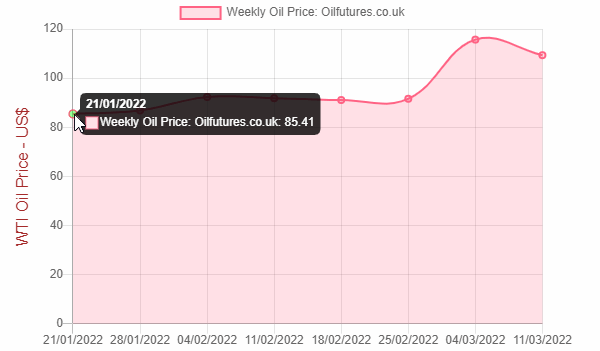The price of
crude oil fell on Monday morning in Asian markets, much to analysts’ surprise, defying
the conventional logic.
With the Russian
oil imports banned in the US and UK and the revival of the JCPOA, 2015 Iran
nuclear deal, back in the doldrums, analysts in the realm of crude oil anticipated
just the opposite; the price of crude oil, despite the obvious supply woes, however,
kept falling when markets opened across the world on Monday.
As of 10:30 GMT,
the price of WTI and Brent were at $103.55 and $108.08 respectively.
To make
matters worse, two significant incidents took place in the volatile Middle East
at the weekend: Iran launched a missile attack in Iraq, claiming it was targeting
an Israeli spy network in the region; Iraq, meanwhile, wanted an answer from
its neighbour for violating its sovereignty; in addition, there are signs that political
uncertainty in Libya, a major oil producer in the world, may take a turn for the
worse – yet again.
In short,
the crude oil supply is not going to get boosted in the immediate future, regardless
of the misplaced optimism of the West for a quick fix, in order to compensate
for the absence of Russian oil in the crude oil markets.
Fortunately,
in Europe, spring has already set in and there will not be a spike in demand
for the LNG, liquified natural gas, in the short-run; gas prices are still high,
though.
Even before
the war broke out, Qatar, the tiny Gulf state that used to be the world’s top
LNG producer up until recently, made it abundantly clear that the former would
never be a substitute for Russia when it comes to global gas supply.
Although the
US and UK led the initiative in banning the Russian oil, the indications are
that the rest of Europe still imports fuels from Russia - in the absence of a
substitute, of course. Russia, on its part, has been careful not to use energy
as a tool to hit back at the West in retaliation against the sanctions – and for
obvious reasons.
German Chancellor
has already voiced his concern about turning Europe’s collective back on
Russian fuel, citing the difficulty in maintaining what he called, ‘social
cohesion’. It may be the sentiment that
resonates with the like-minded in the European Union, although they are united
against Russia over the invasion of Ukraine.
The prices
of petrol and diesel at the pumps are, meanwhile, rocketing causing severe
anxiety in customers; it has already contributed to the sharp rise in food
prices and transport costs and will take its toll on the global economic
recovery that is reeling from a once-in-century pandemic.
By
committing themselves to leading by example to the net-zero mission, the
options for the West in addressing the supply woes in the crude oil markets are
a few and far between.
The repeated
appeals by the US to the Middle Eastern bigwigs of the OPEC+ for increased
production and even turning to Venezuela, a Latin American enemy up until
recently, for a possible solution, just show how desperate the World’s biggest
economy is in order to maintain its position – in the presence of a scarcity of
fuel.
Despite the
early signals that the UAE may consider an increase in production, the OPEC+
appears to be sticking to its current production targets, i.e., 400,000 bpd rise,
instead of an exponential rise.
In yet another
blow to the hopes of global consumers, the talks on reviving the JCPOA, 2015
Iranian nuclear deal, are back to square one, as Russia wanted a guarantee that
its partnership with Iran would not be affected by the US sanctions; in short,
Iranian oil is not going to reach the international markets through normal
channels – in foreseeable future.
Although Iranian
state-backed media initially criticised Russia against its latest position with
regard to the nuclear deal, they appear to have backed down, blaming the impasse
on the US rather than its long-term ally for the failure; Iran was really
hopeful that the deal was within its grasp – or that of the signatories to the
deal - before the war broke out between Russia and Ukraine.
The price of
crude oil has never been solely determined by the two main pillars of economics,
the supply and demand. Since it is inextricably linked to the global power
politics, its fall in the markets in the early hours on Monday – defying economics
– clearly shows that things have not changed much during the passage of time.








